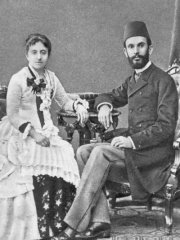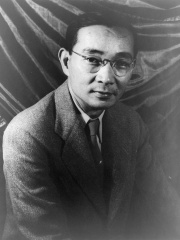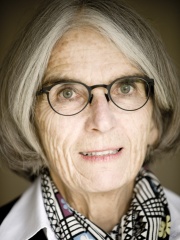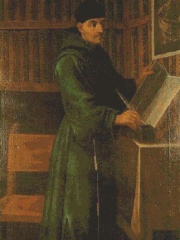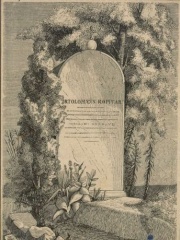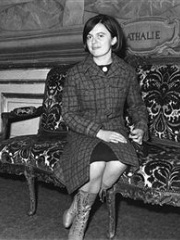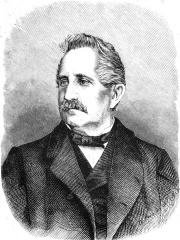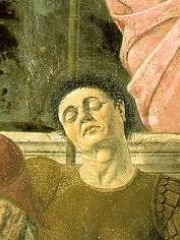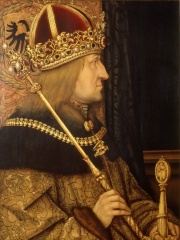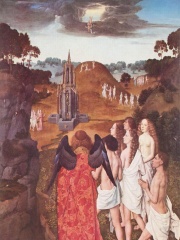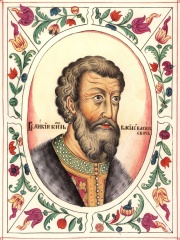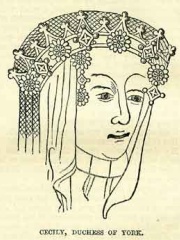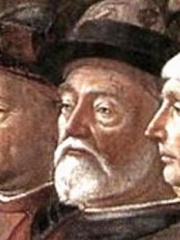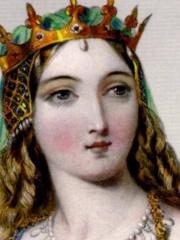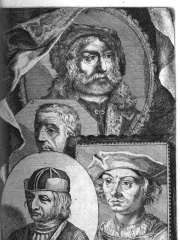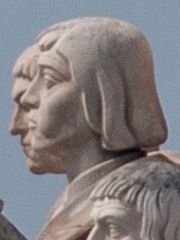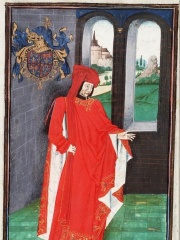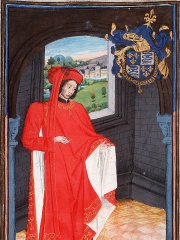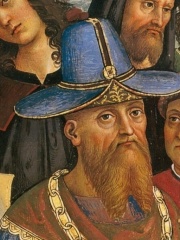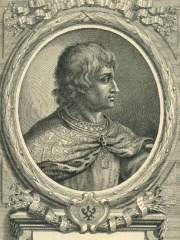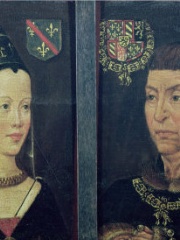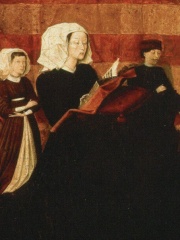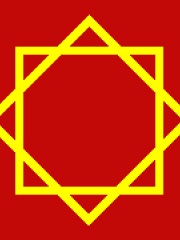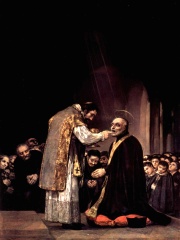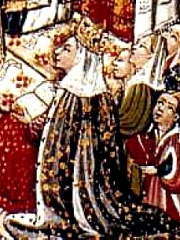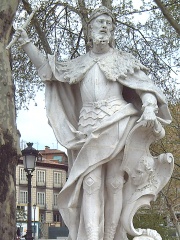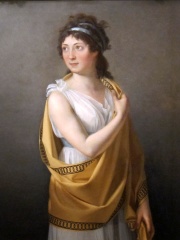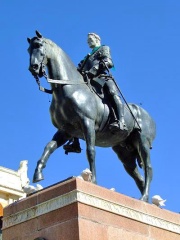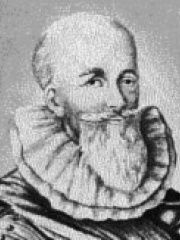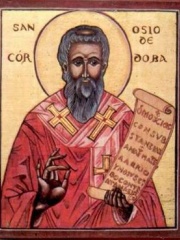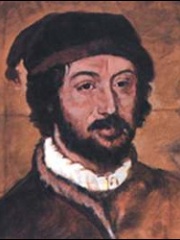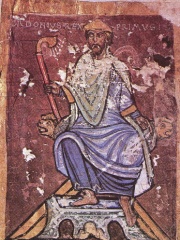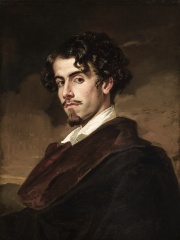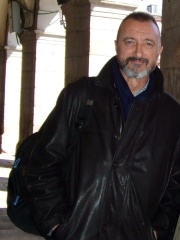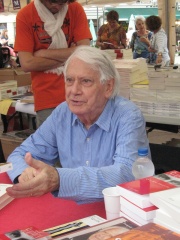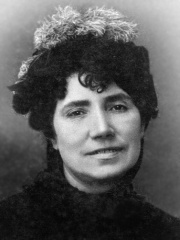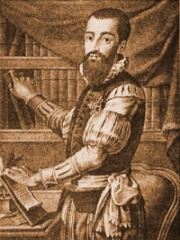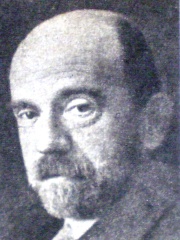WRITER
Joanot Martorell
1415 - 1465
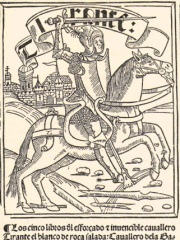
 Joanot Martorell
Joanot Martorell
Joanot Martorell (Valencian: [dʒuaˈnɔd maɾtoˈɾeʎ]; c. 1410 – 1465) was a Valencian knight and writer, best known for authoring the novel Tirant lo Blanch, written in Catalan/Valencian and published at Valencia in 1490. This novel is often regarded as one of the peaks of the literature in Catalan language and it played a major role in influencing later writers such as Miguel de Cervantes, who, in the book burning scene of Don Quixote, says "I swear to you, my friend, this (Tirant lo Blanch) is the best book of its kind in the world". The novel deals with the adventures of a knight in the Byzantine Empire; it is considered one of the first works of alternate history. Read more on Wikipedia
His biography is available in 34 different languages on Wikipedia (up from 33 in 2024). Joanot Martorell is the 1,186th most popular writer (up from 1,370th in 2024), the 386th most popular biography from Spain (up from 470th in 2019) and the 39th most popular Spanish Writer.
Memorability Metrics
Page views of Joanot Martorell by language
Among WRITERS
Among writers, Joanot Martorell ranks 1,186 out of 7,302. Before him are Sami Frashëri, Anne Rice, Lin Yutang, Annemarie Schwarzenbach, Donna Leon, and Bernardino de Sahagún. After him are Zachris Topelius, Jernej Kopitar, Monique Wittig, Michael Connelly, Ljudevit Gaj, and Marshall Rosenberg.
Most Popular Writers in Wikipedia
Go to all RankingsSami Frashëri
1850 - 1904
HPI: 67.03
Rank: 1,180
Anne Rice
1941 - 2021
HPI: 67.03
Rank: 1,181
Lin Yutang
1895 - 1976
HPI: 67.03
Rank: 1,182
Annemarie Schwarzenbach
1908 - 1942
HPI: 67.02
Rank: 1,183
Donna Leon
1942 - Present
HPI: 67.02
Rank: 1,184
Bernardino de Sahagún
1499 - 1590
HPI: 67.01
Rank: 1,185
Joanot Martorell
1415 - 1465
HPI: 67.01
Rank: 1,186
Zachris Topelius
1818 - 1898
HPI: 67.01
Rank: 1,187
Jernej Kopitar
1780 - 1844
HPI: 67.00
Rank: 1,188
Monique Wittig
1935 - 2003
HPI: 67.00
Rank: 1,189
Michael Connelly
1956 - Present
HPI: 66.99
Rank: 1,190
Ljudevit Gaj
1809 - 1872
HPI: 66.99
Rank: 1,191
Marshall Rosenberg
1934 - 2015
HPI: 66.97
Rank: 1,192
Contemporaries
Among people born in 1415, Joanot Martorell ranks 6. Before him are Piero della Francesca, Frederick III, Holy Roman Emperor, Dieric Bouts, Vasily II of Moscow, and Cecily Neville, Duchess of York. After him are Jan Długosz, John Argyropoulos, Jacquetta of Luxembourg, Albert van Ouwater, Afonso Gonçalves Baldaia, and John II, Count of Nevers. Among people deceased in 1465, Joanot Martorell ranks 4. Before him are Charles, Duke of Orléans, Thomas Palaiologos, and Louis, Duke of Savoy. After him are Isabella of Bourbon, Isabella of Clermont, and Abd al-Haqq II.
Others Born in 1415
Go to all RankingsPiero della Francesca
PAINTER
1415 - 1492
HPI: 79.11
Rank: 1
Frederick III, Holy Roman Emperor
POLITICIAN
1415 - 1493
HPI: 78.71
Rank: 2
Dieric Bouts
PAINTER
1415 - 1475
HPI: 71.59
Rank: 3
Vasily II of Moscow
POLITICIAN
1415 - 1462
HPI: 71.46
Rank: 4
Cecily Neville, Duchess of York
POLITICIAN
1415 - 1495
HPI: 68.73
Rank: 5
Joanot Martorell
WRITER
1415 - 1465
HPI: 67.01
Rank: 6
Jan Długosz
WRITER
1415 - 1480
HPI: 66.90
Rank: 7
John Argyropoulos
PHILOSOPHER
1415 - 1487
HPI: 62.83
Rank: 8
Jacquetta of Luxembourg
NOBLEMAN
1415 - 1472
HPI: 62.06
Rank: 9
Albert van Ouwater
PAINTER
1415 - 1475
HPI: 62.06
Rank: 10
Afonso Gonçalves Baldaia
EXPLORER
1415 - 1481
HPI: 60.52
Rank: 11
John II, Count of Nevers
NOBLEMAN
1415 - 1491
HPI: 60.24
Rank: 12
Others Deceased in 1465
Go to all RankingsCharles, Duke of Orléans
WRITER
1394 - 1465
HPI: 73.21
Rank: 1
Thomas Palaiologos
POLITICIAN
1409 - 1465
HPI: 69.82
Rank: 2
Louis, Duke of Savoy
POLITICIAN
1413 - 1465
HPI: 68.15
Rank: 3
Joanot Martorell
WRITER
1415 - 1465
HPI: 67.01
Rank: 4
Isabella of Bourbon
COMPANION
1437 - 1465
HPI: 64.59
Rank: 5
Isabella of Clermont
COMPANION
1424 - 1465
HPI: 63.11
Rank: 6
Abd al-Haqq II
POLITICIAN
1419 - 1465
HPI: 60.74
Rank: 7
In Spain
Among people born in Spain, Joanot Martorell ranks 386 out of 3,355. Before him are Luis Ramírez de Lucena (1475), Joseph Calasanz (1556), Maria of Castile, Queen of Aragon (1401), Ramiro I of Asturias (790), Thérésa Tallien (1773), and Bernardino de Sahagún (1499). After him are Gonzalo Fernández de Córdoba (1453), Bernal Díaz del Castillo (1492), Hosius of Corduba (256), Juan de la Cosa (1460), Ordoño I of Asturias (821), and José María Aznar (1953).
Others born in Spain
Go to all RankingsLuis Ramírez de Lucena
CHESS PLAYER
1475 - 1530
HPI: 67.08
Rank: 380
Joseph Calasanz
PHYSICIAN
1556 - 1648
HPI: 67.04
Rank: 381
Maria of Castile, Queen of Aragon
POLITICIAN
1401 - 1458
HPI: 67.03
Rank: 382
Ramiro I of Asturias
POLITICIAN
790 - 850
HPI: 67.02
Rank: 383
Thérésa Tallien
CELEBRITY
1773 - 1835
HPI: 67.02
Rank: 384
Bernardino de Sahagún
WRITER
1499 - 1590
HPI: 67.01
Rank: 385
Joanot Martorell
WRITER
1415 - 1465
HPI: 67.01
Rank: 386
Gonzalo Fernández de Córdoba
MILITARY PERSONNEL
1453 - 1515
HPI: 67.00
Rank: 387
Bernal Díaz del Castillo
EXPLORER
1492 - 1584
HPI: 66.99
Rank: 388
Hosius of Corduba
POLITICIAN
256 - 357
HPI: 66.97
Rank: 389
Juan de la Cosa
EXPLORER
1460 - 1510
HPI: 66.97
Rank: 390
Ordoño I of Asturias
POLITICIAN
821 - 866
HPI: 66.97
Rank: 391
José María Aznar
POLITICIAN
1953 - Present
HPI: 66.96
Rank: 392
Among WRITERS In Spain
Among writers born in Spain, Joanot Martorell ranks 39. Before him are Gustavo Adolfo Bécquer (1836), Carlos Ruiz Zafón (1964), Arturo Pérez-Reverte (1951), Jorge Semprún (1923), Rosalía de Castro (1837), and Bernardino de Sahagún (1499). After him are Ruy González de Clavijo (1400), Ibrahim ibn Yaqub (912), Garcilaso de la Vega (1501), Pío Baroja (1872), José de Acosta (1540), and Samuel ibn Naghrillah (993).
Gustavo Adolfo Bécquer
1836 - 1870
HPI: 67.90
Rank: 33
Carlos Ruiz Zafón
1964 - 2020
HPI: 67.57
Rank: 34
Arturo Pérez-Reverte
1951 - Present
HPI: 67.41
Rank: 35
Jorge Semprún
1923 - 2011
HPI: 67.37
Rank: 36
Rosalía de Castro
1837 - 1885
HPI: 67.26
Rank: 37
Bernardino de Sahagún
1499 - 1590
HPI: 67.01
Rank: 38
Joanot Martorell
1415 - 1465
HPI: 67.01
Rank: 39
Ruy González de Clavijo
1400 - 1412
HPI: 66.30
Rank: 40
Ibrahim ibn Yaqub
912 - 966
HPI: 66.01
Rank: 41
Garcilaso de la Vega
1501 - 1536
HPI: 65.96
Rank: 42
Pío Baroja
1872 - 1956
HPI: 65.89
Rank: 43
José de Acosta
1540 - 1600
HPI: 65.66
Rank: 44
Samuel ibn Naghrillah
993 - 1055
HPI: 65.61
Rank: 45
